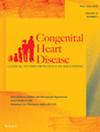Pentalogy of Cantrell with Pentalogy of Fallot and Left Ventricular Diverticulum
IF 1.2
4区 医学
Q4 CARDIAC & CARDIOVASCULAR SYSTEMS
引用次数: 0
Cantrell五联症合并法洛五联症和左室憩室
本文章由计算机程序翻译,如有差异,请以英文原文为准。
求助全文
约1分钟内获得全文
求助全文
来源期刊

Congenital Heart Disease
CARDIAC & CARDIOVASCULAR SYSTEMS-
CiteScore
0.40
自引率
33.30%
发文量
37
审稿时长
6-12 weeks
期刊介绍:
Congenital Heart Disease is an open-access journal focusing on congenital heart disease in children and adults. Though the number of infants born with heart disease each year is relatively small (approximately 1% of the population), advances in treating such malformations have led to increased life spans for this population. Consequently, today most patients treated for congenital heart disease are over the age of 20. What are the special needs of adults with congenital heart disease? What are the latest developments in the care of the fetus, infants, and children? Who should treat these patients? How should they be treated?
Congenital Heart Disease focuses on these questions and more. Conceived as a forum for the most up-to-date information on congenital heart disease, the journal is led by Editor-in-Chief Vladimiro L. Vida, MD, Ph.D., Professor in Cardiac Surgery, University of Padua in Italy, as well as an international editorial board. Congenital Heart Disease publishes articles on heart disease as it relates to the following areas:
• Basic research of congenital heart disease
• Clinical pediatric and adult cardiology
• Cardiac imaging
• Preventive cardiology
• Diagnostic and interventional cardiac catheterization
• Electrophysiology
• Surgery
• Long-term follow-up, particularly as it relates to older children and adult congenital heart disease
• Exercise and exercise physiology in the congenital patient
• Post-op and critical care
• Common disorders such as syncope, chest pain, murmurs, as well as acquired disorders such as Kawasaki syndrome
The journal includes clinical studies, invited editorials, state-of-the-art reviews, case reports, articles focusing on the history and development of congenital heart disease, and CME material. Occasional issues focus on special topics.
Readership: Congenital Heart Disease was created for pediatric cardiologists; adult cardiologists who care for patients with congenital heart disease; pediatric and pediatric cardiology nurses; surgeons; radiologists; anesthesiologists; critical care physicians and nurses; and adult support staff involved in the care of patients with congenital heart disease.
 求助内容:
求助内容: 应助结果提醒方式:
应助结果提醒方式:


